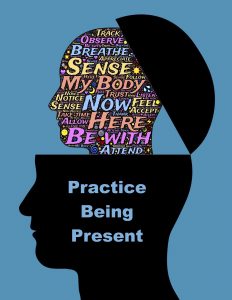Did you know that working faster and faster is the way to bad mental health situations?
Why Mindfulness? – The ‘Doing’ and ‘Being’ modes
It is said that we are human beings not human doings. Yet in our culture and our professional lives we must always be busy – we feel we must live as human ‘doings’. This is also where we tend to live our life on ‘autopilot’.
Before looking at Mindfulness, we need to recognise the two different modes of life – the ‘Doing’ mode and the ‘Being’ mode.
The ‘Doing’ mode
‘Doing’ mode is all about practicality. It consists of:
- Tasks
- Problem-solving
- Goals and the drive to attain them
- The need to measure achievement
- A focus on successful outcomes
- The hatred of failure
There is nothing wrong with the ‘Doing’ mode per se. In fact it can be exciting and fun. It is, also, what drives humanity forward. The trick is to ensure this is not the only mode you are living in.
The ‘Being’ mode
‘Being’ mode is all about awareness and space.
It is very important as it gives your brain and body a rest. This mode gives you time to replenish your mental and emotional resources – housekeeping for the mind and body. It also provides the mental space where you can think of relationships and life. This can enable you to be proactive instead of reactive as ‘Doing’ is not conducive to creative thinking.
Some people when they say ‘let me sleep on it’ are really asking for a chance to retreat into ‘Being’ mode, where their mind can relax and open itself to all possibilities.
This also allows people to deal with the emotional side of the request, particularly difficult or painful ones. When in ‘Doing’ mode your mind is so active you cannot feel your emotions. Hence keeping yourself busy means keeping your emotions at a distance – ‘burying yourself in work.’
So what is Mindfulness?
This can be tricky to explain. There are 3 core concepts to Mindfulness and this blog deals with the first:
Living in the moment – being present!
It can be very easy to rush through life without stopping to notice much. So this is about just being aware of your surroundings and what is going on internally.
Lets engage with the now – now.
Set your phone timer for 30 or 60 seconds. Take your time to:
- Be aware of what are you feeling Are you sitting on your chair, if so does it feel comfortable or not? Do a body check – your neck, back, legs, etc. How do these body parts feel? How is your breathing?
- Pay attention to your thoughts – what are they?
- Check out your senses – what can you see and what sounds and smells are you aware of?
- Consider what emotions are prevalent while you are ‘living in the moment’.
After your set period you may want to record your impressions of being totally present in those moments.

Consider these times as giving yourself a mini-break or ‘breathing space’ from worrying about the future or feeling guilty about the past. Once you are in the habit of taking these ‘living in the moment’ breaks, you may want to increase the time you do this. You could expand to five minutes, perhaps with your favourite hot drink. That way you can easily embed this twice a day as a habit with your morning and afternoon drink.
If you would like to know more on how to use mindfulness to manage your stress and build resilience, please contact me: ann@yorkshirecoursesforlawyers.co.uk or telephone me; 07921540039 for coaching. For Mindfulness coaching I have a special offer of three coaching sessions for the price of two.
I am also running 2-hour lunchtime workshops on An Introduction to Mindfulness and Managing Stress in Leeds, Harrogate and Hull – please check out my events page for one near you: http://www.yorkshirecoursesforlawyers.co.uk/events/
YCFL delivers strategic coaching and training in leadership, management and interpersonal skills for the legal profession. Since 2003 Ann has trained nearly 7000 lawyers in leadership, management and interpersonal skills. She launched her Business Brilliance Blueprint in 2017 for owners of law firms so that they can serve more clients profitably. Ann has also trained with the Coaching Academy and holds a H.N.L.P. certificate in coaching as well as being an N.L.P. Master Practitioner.

1 Response to "An Introduction to Mindfulness for Lawyers Part 1"
[…] blog, An Introduction to Mindfulness for Lawyers Part 1 introduces the first core concept of ‘being present’. My clients have found that it helps them […]